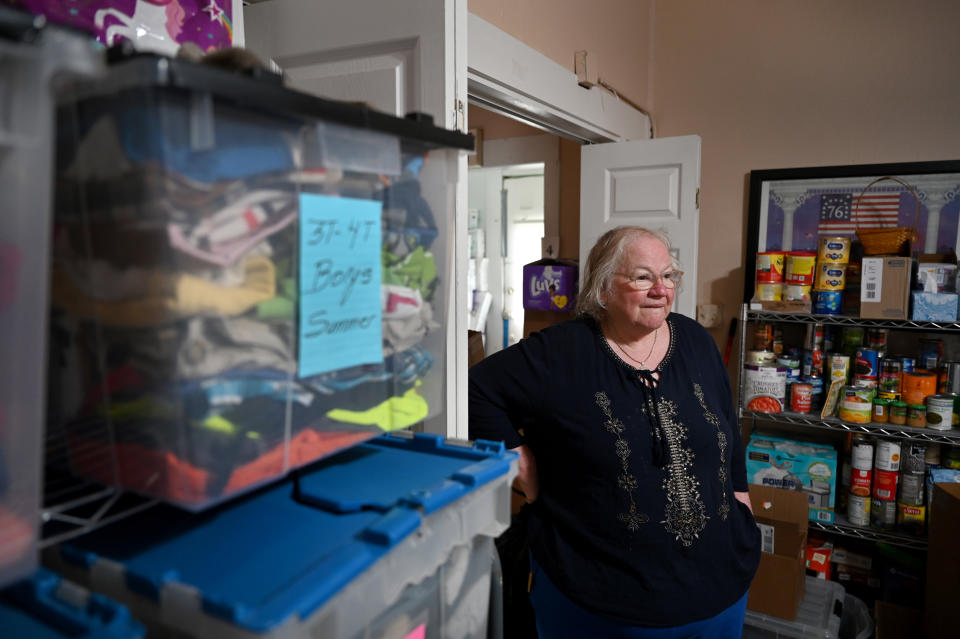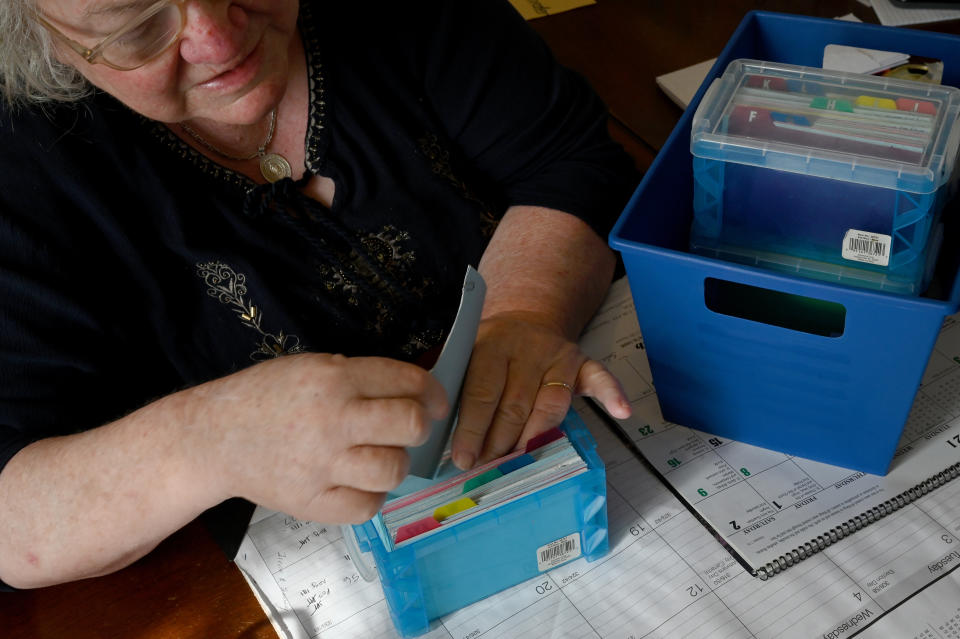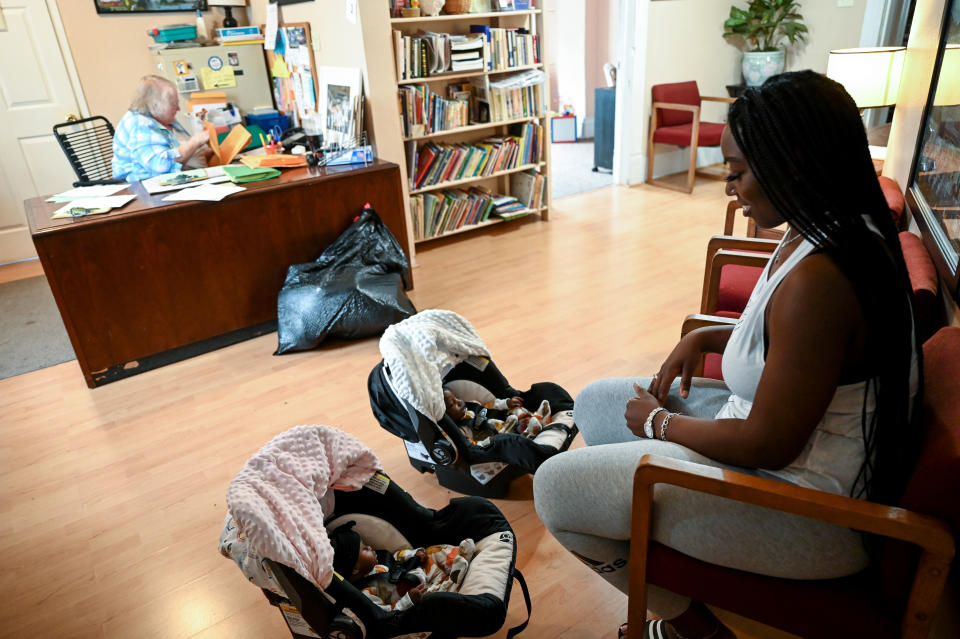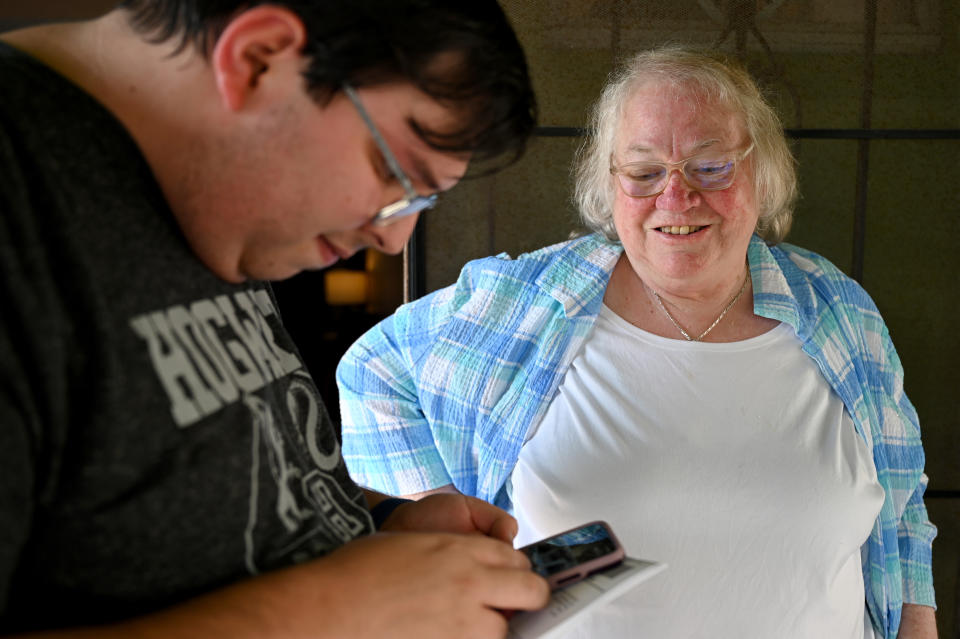What happens when people in Texas can't get abortions: 'Diapers save a lot more babies than ultrasounds'
SAN ANTONIO - Tere Haring worked the math. Already, the antiabortion nonprofit she runs had given away a record number of baby items during the pandemic. She'd helped five women a day in 2020, and she'd handed out 71 car seats, 45,569 diapers, and $71,000 in rent assistance. Then, in September, a state law banning abortions after six weeks went into effect. By late October, Haring was seeing seven or eight clients a day. The phone rang, then rang again.
That uptick was just the beginning, Haring figured. The number of abortions had fallen by half during the ban's first month, from 5,377 statewide in August to 2,164 in September. For most antiabortion activists, that drop was a victory, proof that the restriction had saved more than 3,000 babies.
But stopping women from having abortions was the easy part, Haring often told people. What came next would be much harder. Those 3,000 babies were going to need diapers and formula and any number of more expensive items, too. The women Haring called "abortion-minded" tended to be in untenable situations. Many couldn't afford a playpen, let alone a month's rent.
"I always said abortion is the lack of an option," Haring said. "They feel like they have nowhere to go, that there's nobody for them. It's about the help. It's about being there for them."
Haring believed it was her Catholic duty to help women who didn't get abortions. The only problem was: Her coffers had dwindled as the need had risen. Donors who used to send $5,000 to Allied Women's Center cut their gifts back to $2,500 during the pandemic. Others stopped mailing checks altogether.
Haring didn't need much. Most crisis pregnancy centers owned ultrasound machines and other medical equipment, but Haring ran a no-frills operation. The paint was peeling in places, and her furniture was secondhand. She didn't have art on the walls, just framed jigsaw puzzles she'd put together herself while raising 15 children. For 27 years, she raised most of the money she needed with a single annual fundraising gala that usually brought in about $150,000 - enough to support 100 babies for six or 12 months. But this year, Haring suspected, the need would probably outpace donations.
There was another way, Haring knew. A month before lawmakers passed the abortion restriction, they'd funneled $100 million into what they called Alternatives to Abortion, a program that, according to a state website, "promotes childbirth and provides support services to pregnant women and their families, adoptive parents, and parents who have experienced miscarriage or the loss of a child." One center across town had accepted $247,300, but Haring didn't want the state's money.
And so she hung her hopes on the upcoming gala featuring a keynote speech by Alveda King, an antiabortion activist and a niece of the slain civil rights leader.
God had steered these women away from abortions, Haring believed. Now, it was up to Him to give Haring the money to help them raise a child.
- - -
Haring could trace all of it - the donations, the adoptions - back to a single day. It was either 1984 or 1985, and she was standing across the street from an abortion clinic in Washington, D.C., as antiabortion activists blocked the door.
Haring went to the clinic that day because her husband, John, was a lawyer who'd agreed to represent their preacher if he got arrested while protesting. The mid-'80s were a particularly volatile time in the fight over reproductive rights. Antiabortion activists forced their way into clinics to dismantle machines and other medical equipment. They followed doctors home, and some even bombed facilities in Maryland and Florida.
Even from a distance, Haring said, the mood felt intense. Everyone was screaming, and she couldn't hear much, so she had to lean in when a man passing by pointed to the red-brick building, then started to talk.
" 'You're telling these people not to go in there,' " Haring said he told her. " 'But what are you doing for them? You got to do more than tell them not to go in.' "
Haring had grown up Catholic in Mexico City and Brownsville, Texas, but she hadn't thought much about abortion before she met her husband. John ran a firm called the Defenders of the Defenders of Life. Through him, Haring had come to believe that abortion was murder. Still, though, the man on the street made "a very fair argument." None of the activists she knew had done anything for the women they'd prevented from having abortions.
The man walked away and later, after police arrested the pastor and dozens of others, Haring thought of a saying she'd unknowingly cribbed from the book of Matthew: "Inasmuch as ye have done it unto one of the least of these my brethren, ye have done it unto me."
Haring returned to the clinic to talk to women, but also began to collect donations. She soon learned she didn't need to block a clinic to stop people from ending their pregnancies. All Haring had to do was raise enough money to cover their rent.
The Harings moved to Texas in 1986 after John was arrested outside the Ladies Center Inc. in Pensacola, Fla. John found the experience of being handcuffed "traumatizing" and decided they should move to Texas to get away from the antiabortion movement. They laid low for a year or two but eventually started protesting again. In 1994, after President Bill Clinton signed the Freedom of Access to Clinic Entrances Act, the Harings' 13-year-old daughter Margaret was arrested on charges of trespassing at a clinic in Little Rock.
A month later, in August 1994, Haring opened Allied as a nonprofit crisis pregnancy center.
Pregnancy centers have existed since the late 1960s. Some are medical clinics, but many employ unlicensed counselors to dissuade women from ending their pregnancies. Critics say the centers use dishonest tactics. Some open next to abortion clinics and include words like "choice" in their name. A Woman's Haven, a pregnancy center across the street from San Antonio's largest Planned Parenthood clinic, even copied the abortion provider's same font and color scheme on its signs.
For years, the centers sustained themselves through donations, but in 2005, Texas lawmakers began siphoning money from the state's Temporary Assistance for Needy Families fund to create the Alternatives to Abortion program. The program, modeled after one in Pennsylvania, initially had a budget of $5 million and served just 11 clients. This biennium, after participants said they'd served more than 101,000 clients - a 52% increase over the previous year - lawmakers bumped the budget from $80 million to $100 million.
The program's leaders have said the money goes to food pantries, maternity homes and material goods for parents. But the Austin Chronicle found in 2018 that recipients spent up to 100 times as much counseling patients against abortion as on maternity clothes. (Leaders at the Texas Pregnancy Care Network, which administers the program, did not return calls for comment.)
Some participants tout their faith on their websites and brochures. Catholic Charities won a contract for nearly $409,000, and the Pregnancy Center of the Coastal Bend, a Corpus Christi-based center due to receive more than $566,000 this biennium, has regularly posted about God on its Facebook page. But state and federal law prohibits recipients from proselytizing or pushing religious activity on the people they serve. For Haring, that was one reason to reject the money.
Haring keeps what she calls a "little chapel" in the back of the center. It's one room with a six-foot tall painting of Mary and three kneelers where Haring sometimes prays for women in need. Hardly any of her clients go in it. But Haring doesn't want to change what she does, and she doesn't want to lie to the state.
She also doesn't want to fill out extra paperwork. She keeps track of her clients with index cards she tucks into the kinds of boxes other women use for recipes. Every Thursday, Haring pulls out the notecards, and she writes a letter to a bookkeeper she pays $6,000 a year. In late October, she made a list in slanting print: She gave 120 size-4 diapers to one woman, and three boxes of size 5, 6 and 7 to another. She gave away a crib, a changing table, two strollers, three swings, a highchair and two travel cribs.
"88 diapers," Haring wrote next to another woman's name. "100 wipes."
Most of the women who came to Allied already had children. They didn't need an ultrasound to tell them what they already knew, and they didn't have time to take classes to earn points to buy the things they needed, as some pregnancy centers require.
"I always tell people, 'Diapers save a lot more babies than ultrasounds.' " Haring said. "I don't want an ultrasound machine. I want tons of diapers. Buy me $20,000, $40,000, $50,000 worth of diapers because if you have a woman who comes in with four kids - yeah, looking at the baby, she realizes it's a human being. But if you tell her, 'I'm going to give you diapers for all four kids,' believe me, the diapers for all four kids is going to save that baby a lot quicker than a little pennant on the screen."
- - -
Officially, Haring promised to help women the year after they gave birth, but many tended to stick with her long after. They came in for one pregnancy and returned for a second, third, even fourth child. One Thursday morning in late October, the front door swung open, and a tall woman with long braids stepped in holding two car seats and twin newborns.
"Hi, Kenecia!" Haring said. "How you doing? Look at those babies."
Haring had met Kenecia Warren five years earlier, after Warren decided against ending her first pregnancy.
"I've been OK," Warren said, setting the car seats down. "It's a challenge. I'm going to be able to stay out of work until February, so I'm excited about that. I can get them situated."
Warren was a single mom, and her parents lived far away, so she hadn't been sure, at first, that she could afford to take time off from her job as a paraprofessional. She hadn't spent her stimulus checks, though, and she could save a couple thousand dollars by accepting diapers, onesies and other supplies from Allied.
"Size 2?" Haring asked, eyeing the infants.
"Just for him," Warren said. "She's still in size 1s, and I've got a lot of size 1s."
Haring led Warren toward a room lined with bins of clothes organized by size, gender and season. Haring waved an arm as if to say, "Have your pick," then returned to the lobby to call potential donors. Haring didn't like to watch women picking out the things they needed. Most of the clothes were used, and Haring knew digging through bins didn't exactly feel like shopping, but still, she wanted it to seem somewhat empowering.
A volunteer ducked in and out as Warren set aside folded onesies, and eventually, Warren sighed. She told the volunteer that she'd learned something upsetting on the drive over. Another single mother, one Warren distantly knew, had died by suicide earlier that week.
"It was just so sad that she felt like she doesn't have no support, and she's just going to end it all," Warren said. "I got the story on my phone, but it literally says like, 'I'm tired of having my kids around all the time. Like, I know I'm strong, but I need a break.' "
Warren pulled a Santa-themed onesie out of the stack and held it up to see if it would fit her one of the twins. Most of Warren's acquaintances didn't know she had one child, let alone three. Warren hadn't posted about them on Facebook or Snapchat because she worried people would view her, a young Black woman, as a stereotype.
"There's memes that say if she has more than one baby daddy . . ." Warren said, then trailed off.
When Warren first became a mother, she didn't feel that transformative happiness she'd heard women experience.
"That sounds sad to say out loud," Warren said as she fished out a two-pack of pacifiers. "Like, of course, I was taking care of her. She was breastfed for a whole year. I did all that stuff to check all the marks and take care of her, but I didn't feel that connection."
Haring could give Warren an extra crib or a free bouncer, but when the twins needed shots, Warren still had to take them to the doctor alone. Haring couldn't change the way people stared at single Black mothers, and she couldn't heal whatever unnameable pain had plagued the woman who died.
- - -
Warren left with a bouncer, an armful of clothes and enough pacifiers to last a year. When the door thudded shut, Haring turned her attention to the gala. More than 400 people had signed up to attend.
"I'm going to make a display," Haring announced. "So, when people are deciding how much money they're going to donate, you know, they can see this is ideally what every mom needs for the first year."
Haring snaked her way through clothing bins. She pulled out a crib, a stroller and armfuls of baby clothes. She had just started stacking boxes of formula when her youngest son arrived.
Peter was Haring's youngest child, one of nine she and John adopted. Haring met Peter's biological mother in the late 1990s soon after the woman delivered another baby. Haring said she helped the woman for a while, then Child Protective Services took the baby away. When the woman became pregnant with Peter a few months later, Haring agreed to adopt him.
Peter hugged Haring, then studied her growing tower.
"Mom," he said, "you know you can just take a photo and print it out."
Haring shook her head. That wouldn't be as effective, she thought.
"Do we have enough diapers? Haring asked.
Peter shrugged, then began loading a pair of minivans with car seats and a playpen. When they were finished, they headed to a cafeteria to meet John and one of Haring's older sons for dinner. They almost always ate out. When the kids were young, Haring had found it too daunting to cook for so many, so she'd mapped out a list of restaurants that allowed kids to eat free. This cafeteria was a favorite, she said, because it gave away kids meals twice a week.
Haring ordered chicken fried steak, and she chose the longest table in the dining room, but most of the seats remained empty. Only a few of their children lived close by. One of her daughters was studying at the Mayo Clinic in Minnesota, and her oldest son lived in San Francisco. Without them, Haring said, the table felt empty.
"We should have adopted more," John said.
"No," Haring said. "I'm done."
"I would have liked to have more. We were fostering a boy for a year, Peter's half brother, but someone else adopted him. I was going to name him Kuykumdall Throckmorton," John said, referring to a family name.
Haring laughed. "That's why God didn't give him to you," she said.
- - -
When the gala commenced on the next evening at 7 p.m., the crowd grew so big that Haring had to give up her seat. She shuffled between the tables as Richard Reyna, a host for a local Catholic radio station, took the stage. Many women had on gowns and high heels but Haring wore the same black cotton dress she'd worn to the last eight galas. She wore the shoes she wears every day to work.
"This just in," Reyna said. "A few hours ago, the Supreme Court rejected the Biden administration's request to block the Texas heartbeat law."
The crowd roared. Haring clapped, too, though she doesn't consider herself a Republican or a Democrat. She's worked the polls for both parties, and once, at an event honoring conservative leaders, she became so angry at a speaker's anti-immigration stance that she wrote "God has no borders" on her program, then marched out, holding it up like a sign. Still, abortion matters to her more than any other issue.
Later, Haring brought Peter onto the stage with other "saved babies."
"I get goose bumps," Haring told the crowd. "They are here because we were there, so this is my work. I feel so close to these children."
In her keynote speech, King denounced critical race theory, and she sang "This Little Light of Mine" before reminding the crowd that they were the "front line" in the "fight for life." The state of Texas was now home to more pregnancy centers than it was "abortion mills," she said. It was time to stuff those envelopes with checks.
Collectively, the audience gave $108,000 - enough to cover rent assistance for a year, Haring figured, but not enough for all the diapers she'd hand out. Others pledged to send a total of $24,000, but as guests approached the bar for one last round of free wine, Haring told herself she'd call a few churches soon to see if they'd donate supplies.
The crowd thinned out around 9 p.m., and Haring returned to her display. She kept thinking about a woman who'd called an hour before the gala. Her name was April.
"I'm sorry," April had said in a voice that hitched and sank with sadness. "I know you've helped me a lot lately. I'm sorry, but I need a little more help. I'm sorry."
Haring pulled a box of diapers from the display. April would need this pack of size 2s and maybe the portable crib, too. She'd need at least 10 hangers' worth of clothes, Haring thought as she tugged a highchair forward. Another woman, a mother of four whom antiabortion activists had talked out of terminating a fifth pregnancy, would need formula and rent assistance.
She'd need wipes and diapers, and then, after the baby was potty-trained, so much more than that.
Related Content
What the Taliban's youngest fighters tell us about the future of the movement




